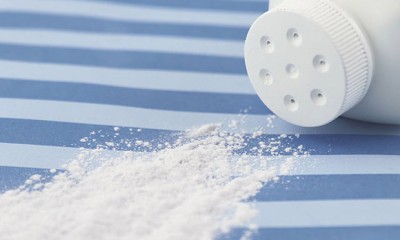Bombshell Lawsuit Links Baby Powder to Cancer

A jury in St. Louis has ordered pharmaceutical giant Johnson & Johnson to pay damages of $72 million to the family of a woman dead from ovarian cancer following her prolonged use of their personal care products containing talcum powder.
This class-action suit is one of two filed in 2014, both of which claimed the use of J&J’s Baby Powder and Shower to Shower products were responsible for giving women ovarian cancer.
The action came just a year after a South Dakota woman’s claim that J&J was negligent because it failed to issue a warning of the dangers of these products during the 30 years she used them. She was also diagnosed with ovarian cancer. The suits highlight J&J’s failure to act responsibly in warning its customers about the inherent danger of products containing talcum powder.
The verdict brings the first award by a U.S. jury from the claims against these consumer products. Twelve hundred more cases have already been filed, and many more will likely follow, alleging that the company kept silent about information revealing that talc-based products could ignite cancer, in an effort to safeguard their bottom line.
J&J Baby Powder has been around since 1893, but it was not widely used until the affluence following World War allowed it to be a standard product in almost everyone’s home. Advertisements led women to use it sprinkled on their private parts and dusted on their underwear and sanitary pads, with the idea that it would control moisture and create a feeling of coolness and comfort.
It was also used to disguise odors from the vagina and dusted on diaphragms, condoms, and Tampax. It is easy to see how these applications would have led to reproductive tract exposure. Why didn’t they cause cancer 50 years ago? Women then were not under the constant onslaught of toxicity that they face today, and their constitutions were more resistive.
There is research to back up the connection between talcum powder and ovarian cancer. A pooled analysis of 8,525 cases and 9,859 controls found that genital talcum powder use was associated with a modest increased risk (1.24) of epithelial ovarian cancer, relative to women who never used powder.
A study from the University of Illinois at Urbana assessed the relationship of powder use with risk of disease subtypes according to histology and degree of malignancy. The research team concluded that the International Agency of Research designated exposure to genital powders as a possible carcinogen in women. A modest association of cancer from this exposure was again seen in their study and in some previous studies.
Does J&J have your welfare in mind?
In late 2013, J&J paid in excess of $2.2 billion in criminal and civil fines to settle charges of wrongly promoting the antipsychotic drug Risperdal to people for whom it was inappropriate including children, people with developmental disabilities, and the aged. Only two pharmaceutical settlements in U.S. history have been larger.
Katie Thomas writing for Business Day said:
“It is part of a decade-long effort by the federal government to hold the health care giant – and other pharmaceutical companies – accountable to illegally marketing the drugs as a way to control patients with dementia in nursing homes and children with certain behavioral disabilities, despite the health risks of the drugs.”
Surgical mesh is sometimes used during uro-gynecologic procedures in postmenopausal women who are hormone deficient and have sagging organs and tissues. Less than a year ago J&J, staring into 23,000 lawsuits from women who were injured from their vaginal mesh implants, agreed to settle its first cases.
The women suing J&J assert that its design is flawed, and the manufacturer failed to report this to the public. As a result the implants are said to be painful, and cause organ damage and infection. The figure for this settlement is not yet known.
These cases are just the tip of the iceberg. For a more comprehensive list, visit http://www.johnsonandtoxin.com/

